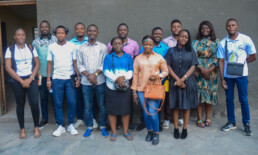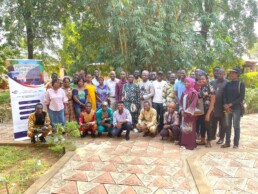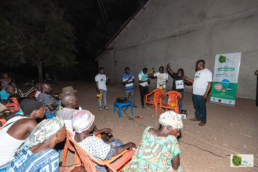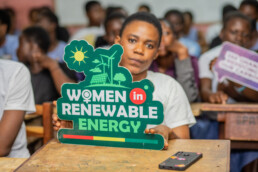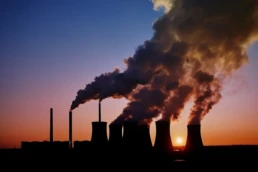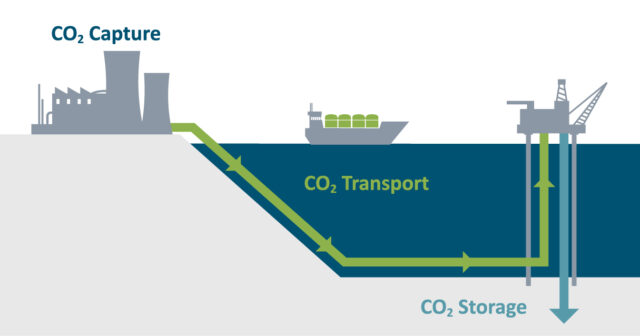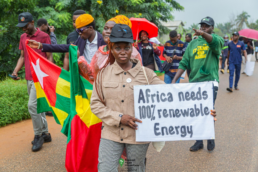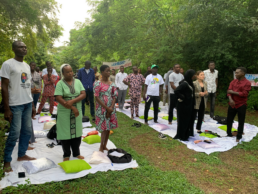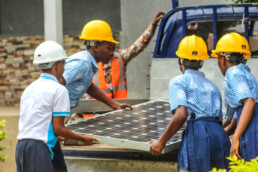Earth Day: Plastic Pollution, a Global Crisis with Devastating Impacts on Africa
Earth Day reminds us of the urgent need to understand the serious problem of plastic pollution and how it disproportionately affects vulnerable communities in Africa. Plastic pollution, largely fueled by our dependence on fossil fuels, worsens the climate crisis, leading to harmful effects on ecosystems, livelihoods, and health.
Plastic is a pressing global concern, but its impact on Africa is particularly severe. Over 99% of plastic is made from chemicals sourced from fossil fuels and is mainly produced by big corporations closely linked with the fossil fuel industry. The production of fossil fuel generated plastic increases greenhouse gas emissions and worsens climate change. With only 9% of plastic waste being recycled globally and 22% mismanaged, Africa bears a disproportionate burden. Much of the plastic waste generated elsewhere, especially in the Northern Hemisphere, finds its way into Africa, legally or illegally.
This results in escalating climate impacts which disproportionately affect communities across the African continent. Despite efforts to adopt cleaner energy sources, the widespread use of single-use plastics continues to tie us to fossil fuels. This reliance not only damages the environment but also poses a threat to communities worldwide. Shockingly, plastic production already contributes 3-4% of global greenhouse gas emissions, and this could triple by 2050 without significant action.
Africa, historically used as a dumping ground for waste from wealthier nations, still faces the consequences of waste colonialism. The proposed Global Plastics Treaty offers hope of addressing this injustice by advocating for responsible waste management, setting standards for plastic consumption and charting a path to a plastic free future. Plastic pollution worsens existing social injustices, disproportionately affecting marginalized communities. These communities suffer from health risks associated with plastic production, such as cancer and asthma, while the fossil fuel companies often evade accountability. It's crucial to involve indigenous communities, waste collectors, and frontline groups in treaty negotiations to ensure fair solutions to the crisis. Communities at the frontline of the plastic crisis endure daily challenges, including economic hardships and exposure to harmful chemicals. Their input is crucial in developing effective strategies to combat plastic pollution.
The promotion of chemical recycling as a solution is controversial because it perpetuates fossil fuel extraction and plastic production, further harming communities and the environment. Instead, decision-makers should focus on implementing a robust plastics treaty that significantly reduces plastic production, regulates plastic consumption and fosters the complete phase out of plastics.
On this Earth Day, it's essential to recognize the urgency of addressing the plastic crisis and its adverse impact on African communities. Simply relying on recycling is not enough; we must tackle the root cause of the problem by implementing global measures to kick out plastics and hold the fossil fuel industry accountable for its role in the plastic crisis in order to address the environmental and climate injustice. Earth Day is a time when everyday people make incredible things happen for our climate movement. And you can join that movement. Sign up for our network or make a donation today. Any amount, big or small, will help escalate our climate campaigns. Demand that world leaders make fossil fuel companies pay for their destruction. We need this to fund the energy transition we urgently need.
By Anna Amar for 350Africa.org
Énergies Renouvelables, alternatives au développement du pétrole et du gaz en RDC
Les activistes et organisations de la société civile ont organisé un atelier de réflexion autour de la promotion des énergies renouvelables comme alternative au développement du pétrole et du gaz en RDC afin de renforcer leurs plaidoyers contre le projet du gouvernement congolais de vendre aux enchères 30 blocs pétroliers et gaziers.
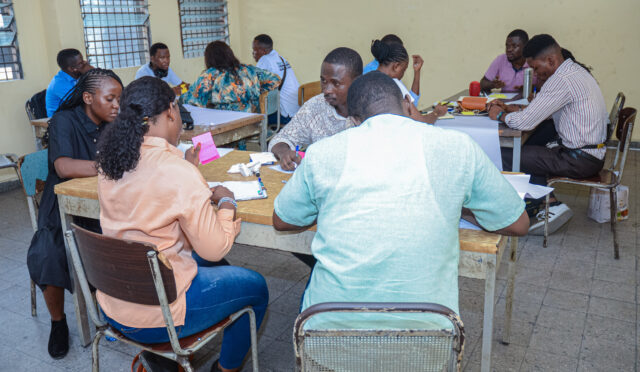
En effet, le pays regorge d’énormes potentialités en énergies renouvelables qui peuvent capitaliser et contribuer à la lutte contre la pauvreté énergétique et à l’amélioration des conditions de vie des communautés. Pour ce faire, les réflexions lors de cette séance ont aussi porté sur l’initiative Virunga Energy, qui alimente la ville de Goma à 78% avec l’énergie produite grâce aux centrales hydro-électriques. Cette initiative, fruit du partenariat public privé entre la fondation Virunga et l'État Congolais, bénéficie des financements de l’Union Européenne et de la Banque Mondiale pour soutenir ses actions qui jusqu’ici offrent beaucoup d’avantages à la grande satisfaction des communautés.
Nous avons déjà l’expérience des avantages des énergies renouvelables dans notre pays, l’initiative Virunga Energy est un modèle par excellence de promotion des énergies renouvelables accessibles aux communautés qui peut être dupliqué sur l’étendue nationale et qui peut apporter des résultats en termes de réduction de la pauvreté énergétique qui frappe notre pays. Déclare Pascal Mirindi, Activiste Extinction Rebellion DRC/GOMA
Face à la double crise énergétique et climatique à laquelle la RDC est confrontée, les communautés ont plus besoin des initiatives qui vont contribuer à améliorer leurs conditions de vies et pour répondre à ce besoin il est nécessaire de penser aux actions à prioriser.
Il était important pour les forces vives de la société civile réunies de définir un agenda commun assorti d’un plan d’actions stratégiques à mener dans le court, moyen et long terme en vue de contribuer à la promotion des énergies renouvelables en RDC pour le bien des communautés et du climat. Précise Stanislas Kunda, Coordonnateur Adjoint du MJPE-RDC
Au regard de faiblesses signalées avec l’initiative Virunga Energy entre autre le manque de communication efficace et participative des communautés locales, le manque d’appropriation effective de l’initiative par les communautés dans certaines zones, les participants ont à la suite des travaux en groupe, proposé quelques pistes des solutions à prendre en compte, notamment : renforcer la communication autour des énergies renouvelables en RDC par la production d’un guide de sensibilisation destiné aux communautés, aux autorités locales et investisseurs ; promouvoir la formation et le renforcement des capacités sur les énergies renouvelables en milieu rural afin de doter aux communautés les connaissances requises et faciliter la main d’œuvre locale et la création d’emplois durables ; mener une étude pour cartographier les sources en énergies renouvelables disponibles pour chaque région ; renforcer les initiatives locales de jeunes visant la promotion des énergies renouvelables ; réaliser un storytelling ou documentaire sur le cas de Virunga energy avec les communautés pour s’enquérir de la situation.
Il faut une forte mobilisation des fonds pour étendre les projets d’accès à l’énergie sur l’étendue du pays, en se servant des richesses potentielles énergies renouvelables particulières à chaque région, et aussi envisager une gestion qui implique activement la population non seulement en tant que main d’œuvre ou expertise locale, mais aussi dans le processus de décision. Conclu Bonita Nginamau, Présidente de Green Idea ONG
Dans le but de continuer à mener des actions conjointes autour de la promotion des énergies renouvelables en RDC, les forces vives de la société civile ont projeter quelques actions de plaidoyers auprès des autorisations locales pour la promotion des énergies renouvelables pour le bien-être des communautés Une Task-Force informelle pour les énergies renouvelables a été créé afin de continuer à mener les actions dans les jours à venir.
Bonaventure Bondo
FossilFreeDRC
Town Hall on Renewable Energy: Unleashing Renewable Power and sparking a Movement Towards a Sustainable Future
On 15 March, the Renewable Energy Coalition, which represents a diverse group of civil society organisations, community-based groups and grassroot movements hosted the first-ever Town Hall on the Energy Justice in Benin. With over 100 passionate attendees including activists, community leaders, energy experts, and media, we embarked on a journey to champion renewable energy and pave the way for a brighter, cleaner future, fueled by renewables.
 The session commenced with a screening of the documentary "The Renewable Charge," highlighting the critical role of community engagement in renewable energy initiatives. A panel discussion ensued, focusing on the current state of energy access in Africa and the barriers hindering renewable energy adoption. It was emphasized that Africa possesses abundant wind and solar resources, which, when harnessed, can significantly reduce greenhouse gas emissions and provide scalable energy solutions tailored to local communities.
The session commenced with a screening of the documentary "The Renewable Charge," highlighting the critical role of community engagement in renewable energy initiatives. A panel discussion ensued, focusing on the current state of energy access in Africa and the barriers hindering renewable energy adoption. It was emphasized that Africa possesses abundant wind and solar resources, which, when harnessed, can significantly reduce greenhouse gas emissions and provide scalable energy solutions tailored to local communities.
 Engage, Connect, and Empower
Engage, Connect, and Empower
Afterwards, the participants split in the four breakaway groups to connect, engage and share knowledge/experiences:
🎨 Artivism: Harnessing the power of art to build connections, engage people, tell our stories, and demand change. We used renewable energy artivism to inspire young minds to become advocates for renewable energy and to share the vision of a just future powered by clean and fair renewable energy.
📰 Media: Understanding how to effectively report on renewable energy, amplify our message, and drive the shift towards sustainable practices.
💼 Renewable Energy and Green Jobs: Exploring the endless opportunities in the renewable energy sector, sharing insights and experiences to cultivate a workforce build on sustainability.
🌍 COP: Discussions on climate action, dissecting the outcomes of COP28, and charting the path forward towards a renewable-powered world at COP29.
Considering the fact that affordable and clean renewable energy is the key to a better future, participants emphasized the urgent need for policymakers to prioritize investments in renewable energy as a cornerstone for developing sustainable solutions. Two upcoming initiatives were discussed: an art exhibition focusing on renewable energy and online/offline sessions utilizing themes from the Our Own Power Toolkit, a resource by 350.org with the goal of building community involvement in the creation of local renewable energy projects
Stay tuned for opportunities to engage with these groups and advocate for 100% renewable energy solutions for our communities. Together, we can drive positive change towards a cleaner and more equitable energy future.
Navrongo Witnesses Groundbreaking Renewable Energy Documentary Launch
Navrongo, Upper East, Ghana - As the global call for a just transition to renewable energy grows louder, 350Africa.org and 350 GROC have stepped up to the plate with a compelling documentary unveiling a remarkable community-driven renewable advocacy movement in Ghana. Titled ‘The Renewable Energy Charge’, the documentary chronicles the inspiring journey of grassroots initiatives driving renewable energy adoption and ambition in Ghana.
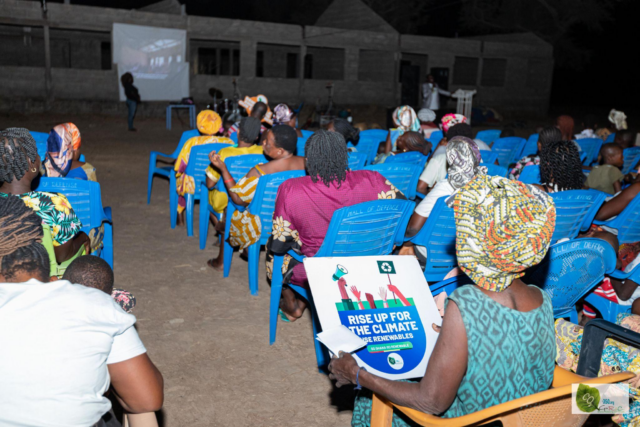
Set against the backdrop of Solar Appreciation Day 2024, the documentary launch took place in Navrongo, a town in the Kassena-Nankana District of Ghana's Upper East region, 12 hours drive from Ghana’s capital, Accra. The event marked not just a screening but a celebration of community resilience and triumph in the face of energy challenges.
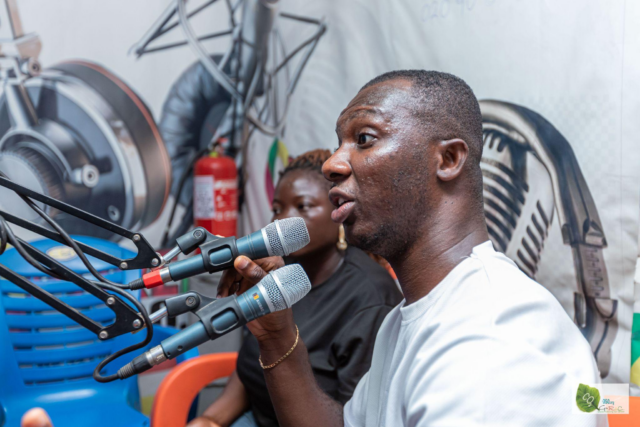
Community screenings held in Nawognia and Pungu on March 9th and 10th respectively served as focal points for spreading awareness and distributing solar bulbs. Over 300 people in Navrongo attended the public screening.
Beyond the screenings, 350 GROC seized the opportunity to forge partnerships with Civil Society Organizations (CSOs) in Navrongo, igniting discussions and laying the groundwork for future collaborations. Thomas Abugah of Concern for Action in Our Community Ghana (CONFAC-GH) hailed the engagement as “fruitful and timely”, affirming his organization's readiness to join forces with 350 GROC for amplified impact.
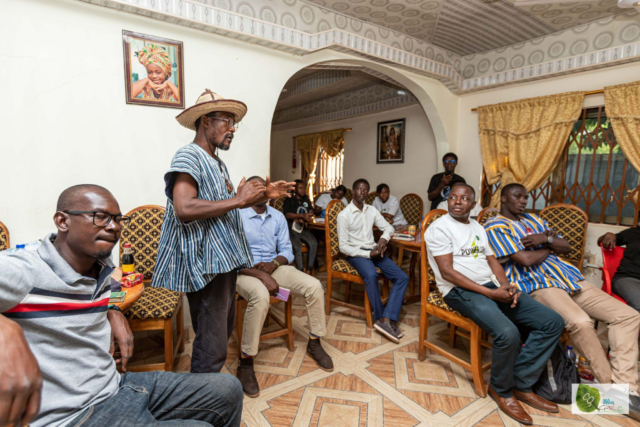
The sentiment was echoed by a plethora of organizations including Sound Mind Foundation, CENSODEV, Levites Basic Needs International Foundation among others, all eager to contribute to Ghana's renewable energy journey.
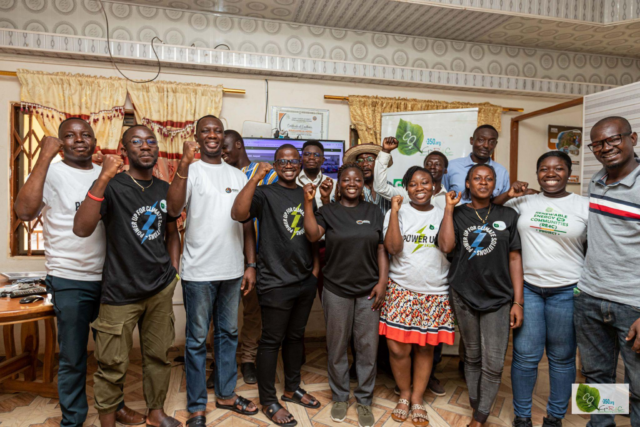
PE Abayage Anankware III, Divisional Chief of Pungu, pledged collaboration with 350 GROC to facilitate a just energy transition in his community, underscoring the documentary's impact rooted in the voices and experiences of community members like himself, now immortalized on film.
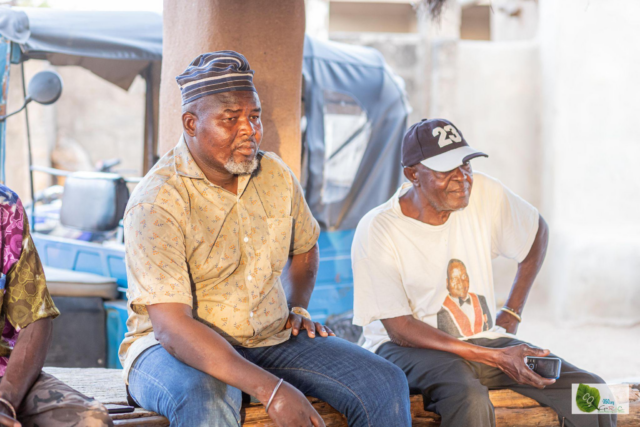
Portia Adu Mensah, National Coordinator for 350 GROC, shared optimism about communities spearheading local solutions for a just energy transition. She emphasized that 350 GROC's success story in Ghana exemplifies how grassroots movements can pave the way, guiding communities toward a renewable energy future.
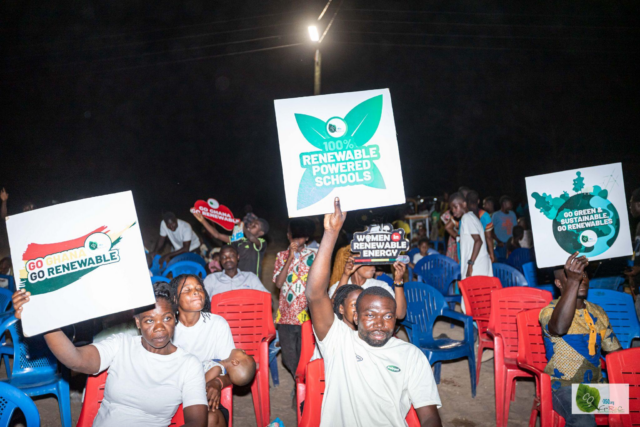
Looking ahead, 350 GROC envisions further engagement with Navrongo's women through its Women in Renewable Energy project, recognizing the pivotal role they play in shaping Ghana's sustainable future. With Navrongo's warm climate and soaring temperatures, the need for renewable energy solutions is not just pressing but imperative.
In the quest for a brighter, greener tomorrow, Navrongo stands at the forefront, a sign of hope for communities worldwide.
Women’s leadership in the Renewable Energy transition in Africa: The RE4C story
In the dynamic landscape of Africa's energy transition, one of the most powerful agents of change often remains overlooked: women. As the continent grapples with the challenges of climate change, energy access, and sustainable development, women are emerging as pivotal leaders, driving transformative shifts towards cleaner and more equitable energy systems.
From rural villages to bustling urban centers, women are emerging as catalysts for positive change in the energy sector, redefining the narrative and shaping a future that prioritizes inclusivity, resilience, and environmental sustainability. Their contributions span diverse realms, from pioneering renewable energy projects to advocating for inclusive policies that prioritize marginalized communities.
Meet Portia Adu-Mensah, founder of Dream Hunt (DH) a Non-Governmental Organization in Ghana and National Coordinator of 350 GROC (Ghana Reducing Our Carbon). Portia is a trained creative activist from Global Power Shift organized by 350.org in Turkey. She is a graduate from Central University College, Faculty of Accounting and Finance with a degree in Banking and Finance. Her love for the environment and urge to fight against climate change in Ghana has inspired and motivated her to lead, join and support environmental campaigns and events that promote environmental sustainability and climate justice.
The journey began in 2013 when Portia found herself at the Global Power Shift in Turkey. Little did she know that this experience would ignite a fire within her, compelling her to co-found 350 Ghana Reducing our Carbon (350 GROC). Energized and connected with global climate activists, Portia and her spirited comrades set out to confront the looming threat of the Ekumfi Aboano power plant, a coal project that cast a shadow over the lives of thousands.
The battle against Ekumfi Aboano became a crucible, testing the resilience of Portia and her team. Through protests and community engagement that spanned three challenging years, victory was achieved – the coal project was permanently shelved. But for Portia and her dedicated team, this triumph was not the conclusion but the beginning of a new chapter.
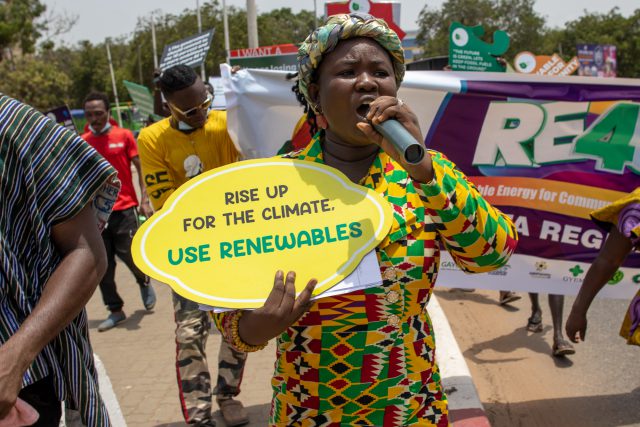
Recognizing the need to shift from opposition to empowerment, 350 GROC expanded its horizons. In 2021, they launched the "Renewable Energy for Communities" (RE4C) campaign. The narrative pivoted to empowering local communities, advocating for sustainable alternatives, and ensuring that the voices of women were central.
In 2022, the RE4C campaign brought together a diverse group of organizations under the banner of the Renewable Energy for Communities Coalition(RE4CC) to accelerate the integration of 10% decentralized renewable energy into Ghana's energy mix by the year 2030.
Portia Adu- Mensah, National Coordinator, 350 G-ROC,
"At its core, the RE4C campaign is about strengthening communities to take control of our energy future. Through education, advocacy, and collaboration, we are working to build a more sustainable and equitable energy system for all Ghanaians. By centering the voices and experiences of local communities, our campaign aims to ensure that renewable energy policies and projects are responsive to the needs of the people. As we take on these efforts at the grassroots level, we urge the government to enforce the implementation of the country’s renewable energy plans, among them achieving 10% renewable energy in the country’s energy mix by 2030. "
The RE4C campaign has not only raised awareness but has become a beacon of empowerment. The initiatives undertaken, from training 100 women in clean cooking techniques to advocating for improvements in Ghana's Renewable Energy Act, exemplify the transformative power of women in the energy transition.
To put the spotlight on women’s leadership in the energy transition in Africa on one hand, 350Africa.org and 350 G-ROC have released a documentary shedding light on the remarkable journey of the Renewable Energy for Communities (RE4C) campaign in Ghana. The documentary, titled "The Renewable Charge," highlights the origins and achievements of the campaign by 350 G-ROC, which evolved from a volunteer-led anti-coal campaign into a powerful community-centered advocacy movement for renewable energy. The documentary could inspire more than one as it captures the resilience and triumphs of women in the frontline working to build a more sustainable and equitable energy system for all Ghanaians.
The film’s premiere took place in an online webinar on the 8th of March, while community screenings are set to be held in Navrongo in Northern Ghana, the location of Ghana’s first Solar PV utility-scale project on 9th and 10th of March. In addition to the screenings, 350 G-ROC and partners will engage local stakeholders and distribute solar bulbs to communities in the area.
Should you want to watch the documentary or host a screening in your network, visit this page to learn more afrikavuka.org/renewable-charge
Inspired by a blog written by Santiago Sáez Moreno, former Languages and Editorial Specialist at 350.org
AFCON sponsorship: A greenwashing strategy by TotalEnergies
The Africa Cup of Nations (AFCON) is not just a football tournament; it's a euphoric celebration of national pride, unity, and the beautiful game that unites us all. As a fan, AFCON is the pinnacle of excitement, a time when our hearts beat in sync with the rhythm of the game, and our spirits soar with each goal scored for our beloved national team. I can’t describe the joy and excitement I felt when Sadio Mané scored the 3rd goal against Cameroon.
One can feel and even touch the passion of football for African youth, and AFCON is the stage where our collective dream comes alive: African Unity. As the kickoff approaches, the entire nation becomes a sea of colors, echoing with cheers, chants, and the beating of drums. We proudly wear our team jerseys, painting our faces with the vibrant hues of our national flag, ready to stand shoulder-to-shoulder with our fellow compatriots.
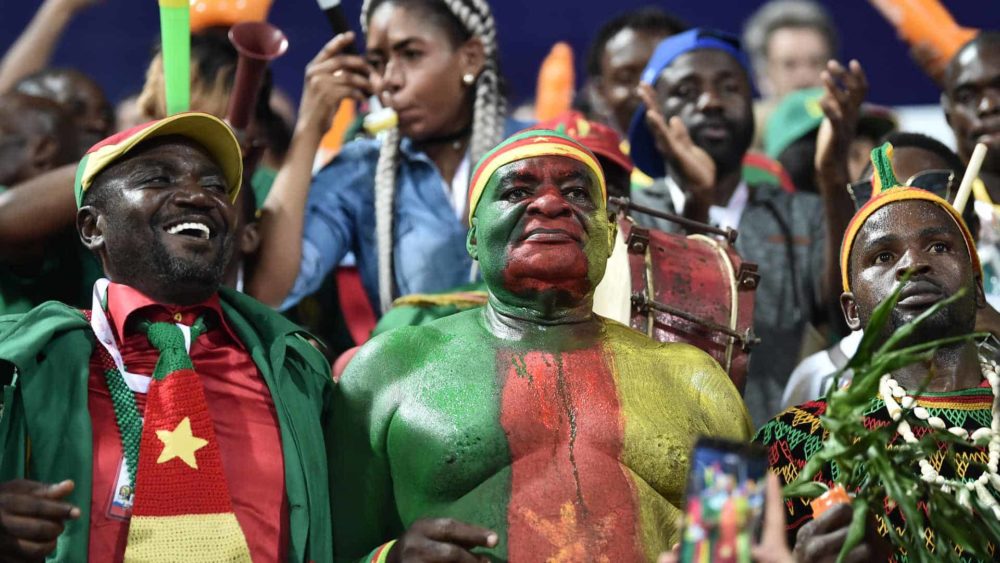
For me, AFCON is more than a competition; it's a showcase of the extraordinary talent that our continent possesses. Our star players become heroes, and their every move on the field is a source of collective joy and celebration. The tournament brings together diverse cultures, languages, and traditions under the common banner of football, fostering a sense of unity and shared identity that transcends borders.
The intensity of each match and the collective roar of the crowd create an electrifying atmosphere. It's a rollercoaster of emotions. However, AFCON is not just about the sport, it’s an “Industry of collective attention”, and it's also a huge greenwashing machine used by fossil fuel companies.
As I watched the game Nigeria vs Côte d’Ivoire, the TotalEnergies logo was suddenly harassing me, knowing all the damages they are causing to the environment particularly in Africa with the EACOP project. Studies show, and TotalEnergies is aware of it, that the construction and operation of EACOP pose grave environmental risks. Worse, TotalEnergies, was aware of the harmful global warming impacts due to burning fossil fuels since 1971 and actively engaged in a sophisticated denial campaign of climate science. The pipeline route traverses sensitive ecosystems, including protected areas and internationally significant wetlands, posing threats to biodiversity and ecosystems that thousands of kids, vulnerable women, and poor families depend on for their sustenance.
As Côte d’Ivoire was scoring in the last minutes, I felt sad and everything vanished. The joy, the excitement, the cheers, and even the stadium disappeared. All I saw was the red, blue, and yellow colors of the TotalEnergies logo.

At that moment, I realized that I, the players, and the million viewers were oiling a huge greenwashing machine run by TotalEnergies. One may not be familiar with greenwashing, so let me unpack it for you.
Major sporting events like the Africa Cup of Nations (AFCON) are used as opportunities for companies and brands to communicate with audiences and shape a good image. Greenwashing is one of these strategies. It involves presenting a misleading image of a brand or company, and events such as AFCON is leveraged by TotalEnergies for such purposes through sponsorship and advertising.
“On July 21, 2016, Total signed an eight-year partnership with the African Football Confederation (AFC), the governing body of football on the continent. Our Company - TotalEnergies - has thus become the title sponsor of the ten main AFC competitions including the prestigious African Cup of Nations (AFCON). Renamed AFCON Total then AFCON TotalEnergies on this occasion, it is the most important sporting event in Africa and the third largest football competition after the World Cup and the European Championship. Africa is part of our DNA.”
According to the Chairman and CEO Patrick Pouyanné: “Africa is an integral part of TotalEnergies’ DNA. Through this commitment, we are strengthening our links and our proximity with our stakeholders and our customers, around popular and festive competitions which always arouse great enthusiasm, including within our teams.”
AFCON becomes a strategic time to capture the audience's attention, what Puyanné refers to as “great enthusiasm”, and shape perceptions before the tournament begins. TotalEnergy even associated their name with the competition per se; so instead of saying AFCON, in the media, they call it TotalEnergy AFCON. Meaning, they own - or should I say usurped - the competition from millions of football fans.
The goal of using greenwashing during AFCON is to manipulate the audience's perception, associating the brand with positive environmental values and diverting attention from any negative environmental practices. One can notice that TotalEnergies launched advertising campaigns leading up to AFCON using a greenwashing strategy by highlighting their environmental initiatives and green products. In this ad, they showcase electric cars, solar-powered device charging phones, green solutions, etc to implicitly shape the image of an eco-responsible company while they are polluting and causing loss and damage among those that are watching the competition.

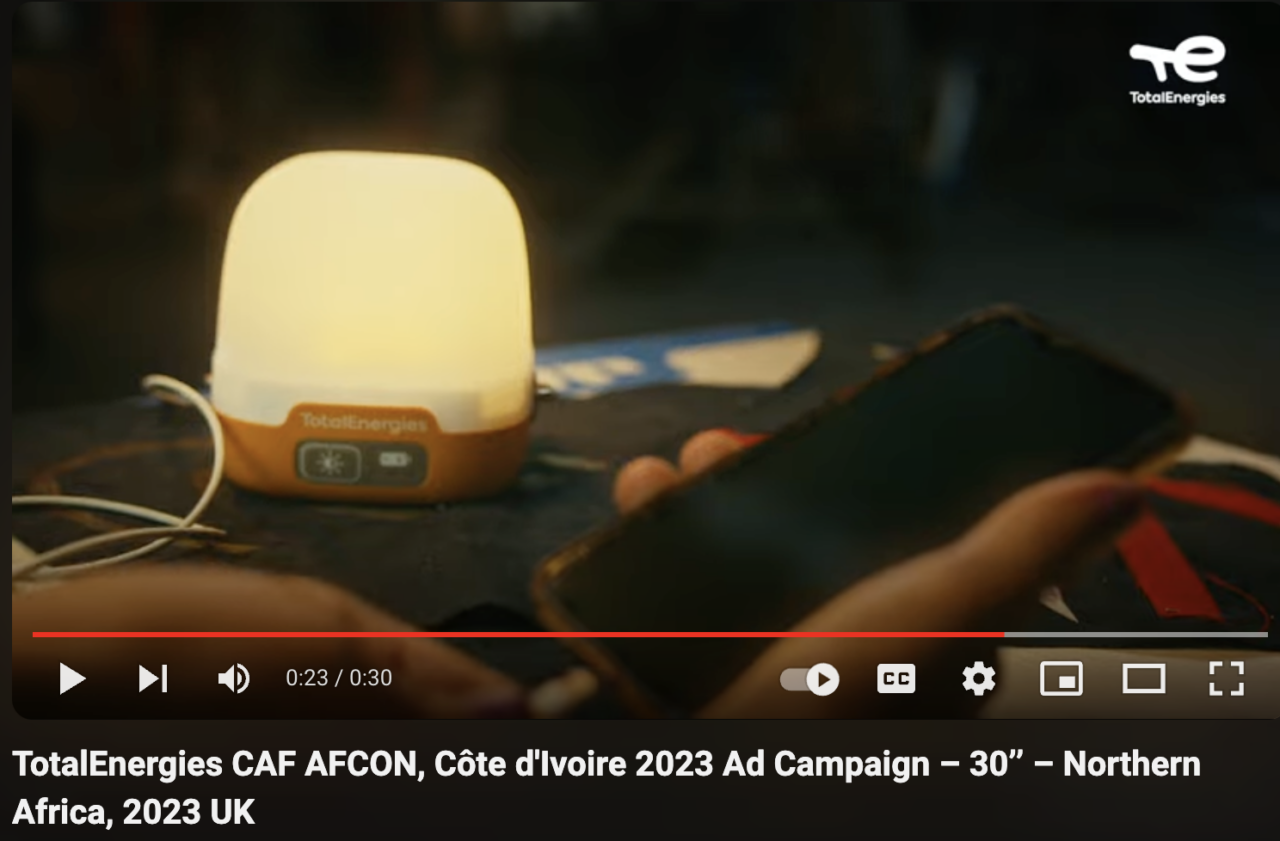
In 2022, TotalEnergies made a record $36 billion profit from its oil and gas exploration in Africa, wrecking the planet and devastating communities. TotalEnergies cannot continue hijacking our prestigious football moment with its advertising. People from impacted communities and countries have already rejected its extractivist-based neo-colonial activities and expansion of oil and gas exploitation. AFCON 2024 must be the last TotalEnergies-sponsored cup! Together, we must join our forces to kick Total Out of the Continent.
Unpacking Carbon Capture and Storage (CCS): Why It is Not the Climate Solution it is touted as
Climate change is a global challenge that demands innovative solutions. One proposed solution that's been gaining attention is Carbon Capture and Storage (CCS). While CCS is increasingly being touted as a silver bullet to combat climate change, it is a diversionary tactic that allows polluters to keep polluting while delaying real climate action and solutions.
In this blog post, we'll break down CCS in simple terms and explore why CCS is a dangerous distraction and not the solution to curbing greenhouse gas emissions and avoiding the worst impacts of the climate crisis.
Understanding CCS: The Basics
Carbon Capture and Storage is like a vacuum cleaner for carbon dioxide (CO2). Imagine your favorite power plant or factory is a giant CO2 factory, churning out tons of the greenhouse gas into the air. CCS steps in to capture that CO2 before it escapes into the atmosphere.
- Capture:
- Imagine capturing CO2 is like catching butterflies. There are different ways to do it, like putting a net after the butterflies (post-combustion), catching them before they fly (pre-combustion), or creating an environment where they can't escape (oxy-fuel combustion).
- Transportation:
- Once we've caught the CO2 butterflies, we need to take them to a safe place. This involves transporting the captured CO2, usually through pipelines or ships, to storage sites.
- Storage:
- Think of storage sites as giant butterfly gardens, but underground. We carefully release the CO2 butterflies into these gardens, making sure they stay put and don't escape back into the air.
Why Some Skepticism?
While CCS sounds deceptively promising, experts and critics have raised concerns about it
Cost Concerns:
- Building and maintaining the CO2-catching vacuum cleaner can be expensive. Some argue that the money spent on CCS might be better used for more affordable and proven green technologies.
Delaying the Switch to Green Energy:
- Critics worry that focusing too much on CCS might slow down our transition to cleaner and more sustainable energy sources like wind and solar power. It's like fixing a leaky faucet instead of installing a more efficient water-saving system.
Butterfly Escapes:
- There's always a risk that some CO2 butterflies might escape from storage sites. If that happens, we're back to square one with greenhouse gas emissions contributing to climate change.
Energy Hog:
- The process of capturing and storing CO2 requires energy itself. It's like using a lot of energy to catch those butterflies, making the whole operation less efficient.
In the grand scheme of things, CCS isn't a simple superhero swooping in to save the day. In addition to the concerns above, CCS affords polluters to continue their harmful practices, fueling climate breakdown, instead of embarking on the urgently needed phase out of fossil fuels.
To truly tackle climate change, we need to eliminate dangerous distractions and employ a mix of real climate solutions. This includes investing, and tripling renewable energy capacity by 2030 which many nations supported at COP28, improving energy efficiency, and phasing out fossil fuels.These measures are critical towards a greener, sustainable and livable future for all.
Tick Tock on the Climate Clock: Youth activists from West Africa Unite for Renewable Energy
From July 19th to July 22nd, over 200 young people from across West Africa gathered to call for urgent measures to tackle the climate and energy crises during an annual forum dubbed the Regional Youth Climate Camp. Organized by the Renewable Energy Coalition members in Benin (ADJEC & JUPD), it was a space of connections, discussions, training, and sharing of experiences on the best practices in terms of community-led renewable energy projects.
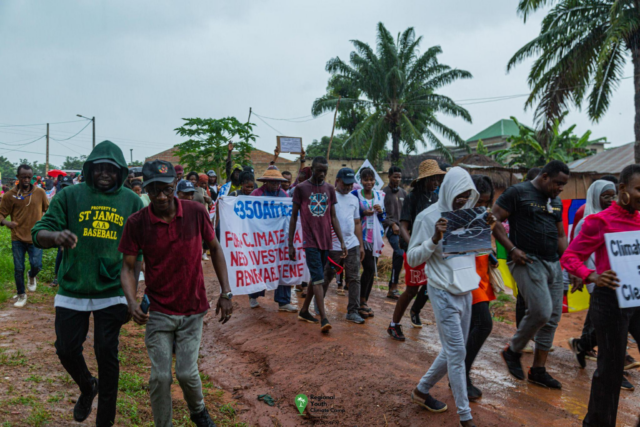
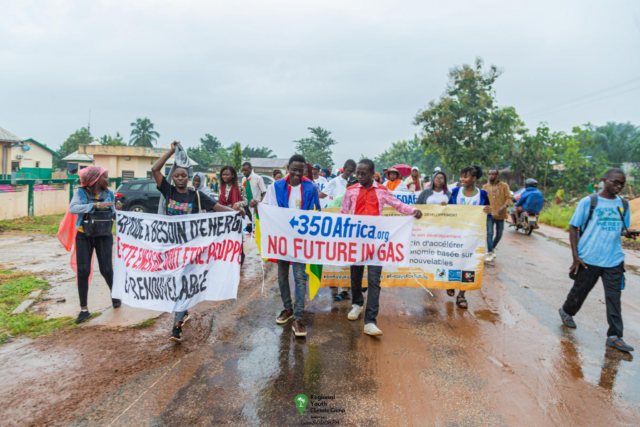
As the heat kept breaking record numbers, the power of collective action and unwavering determination was palpable in the air. Civil society organizations and passionate youth groups around the world gathered and held synchronized actions to mark Climate Emergency Day, on July 22nd. In some areas, activists brought climate clocks from different impacted zones to different business headquarters, demanding that governments and corporations #ActInTime to deploy the global solutions to meet the climate deadline. This is no time to build walls; we need bridges. Climate change affects us all, no matter where we live.
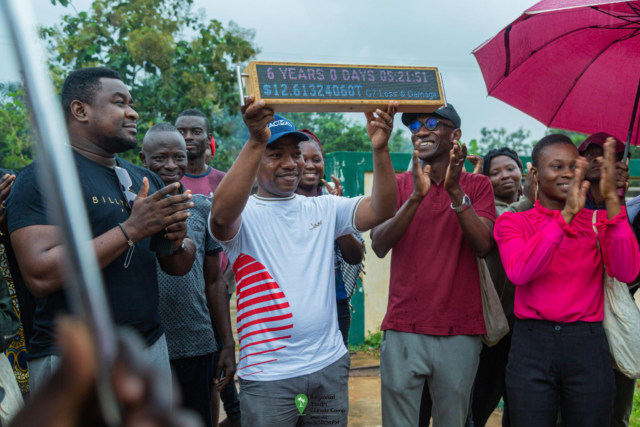
In Benin, the Regional Youth Climate Camp was an opportunity for the youth to raise their voices, shake the world awake, and demand urgent action to tackle the pressing climate crisis. The forum aimed to train and share tools for organizing/campaigning on renewable energy, share the key findings of the renewable energy report by 350Africa.org and mark the Global Climate Emergency Day through a peaceful march geared at advocating for development of renewable energy.
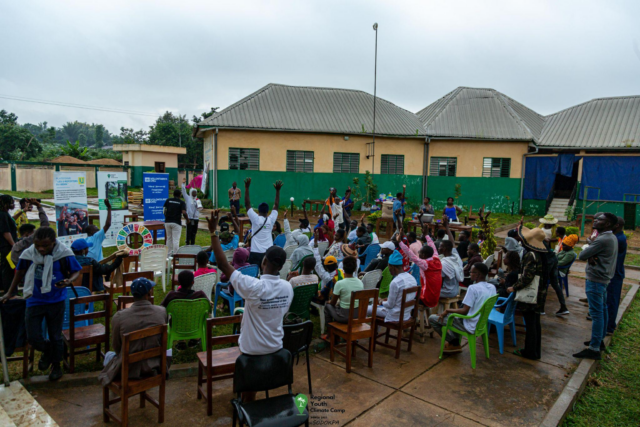
Urgent Demands for a Sustainable Future
As the gathering commenced, a clear and unified agenda emerged. Among the demands were:
- A call for safe, reliable, and affordable renewable energy:
The quest for safe, reliable, and affordable energy is no longer a luxury but a necessity to safeguard Africa's future. Embracing renewables will not only address the pressing energy needs but also pave the way towards a cleaner, greener continent.
- A just transition to address energy needs and catalyze development
By embracing clean energy solutions, Africa can reduce carbon emissions while creating new job opportunities and fostering socio-economic development in the region.
- Zero investments in fossil fuels:
Redirecting financial resources towards renewables will accelerate the transition and steer Africa away from its dependence on harmful energy sources.
- AfDB's support for 100% renewable energy:
The African Development Bank (AfDB) plays a pivotal role in shaping the continent's energy landscape. Young people call on the AfDB to be at the forefront of renewable energy investment, supporting 100% clean energy projects that can transform Africa's future.
- Greater renewable energy ambition and targets in African nation’s NDCs:
Young leaders demand higher renewable energy targets in the Nationally Determined Contributions (NDCs) of African countries. By setting higher renewable energy targets, countries can pave the way for a greener future thereby pushing the climate agenda forward.
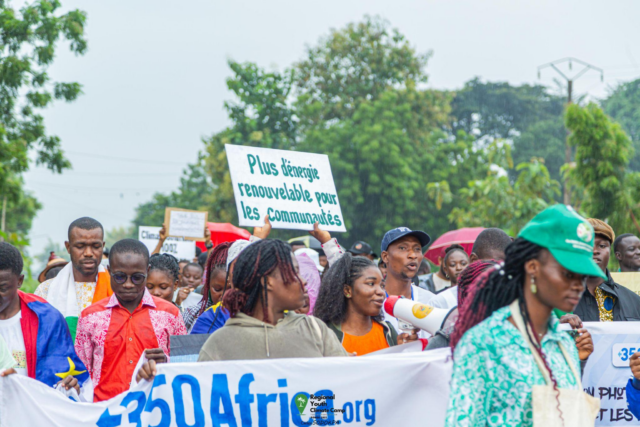
More than 200 activists were trained on organizing for climate solutions and over 500 joined a peaceful march to advocate for renewable energy on Climate Emergency Day. Simultaneously, several groups and civil society organizations from Senegal, Côte d’Ivoire, Nigeria and other West African countries joined the movement and organized their own events for more widespread climate education to mobilize global action and foster a culture of sustainability.
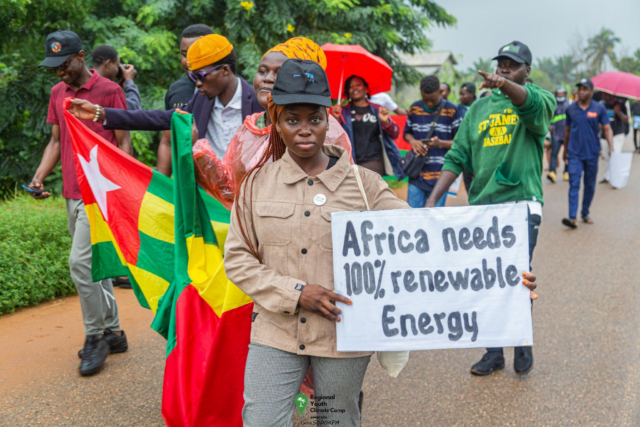
“On climate emergency day, we acknowledge the abundant renewable energy potential in most African nations, offering opportunities for clean energy growth and prosperity to meet the needs of people and economies. Many countries have committed to energy transition plans, moving away from polluting fossil fuels and embracing a sustainable and secure energy future with social and economic benefits. We are joining the calls to end the fossil era before it is too late. The negative socio-economic and environmental impacts of fossil fuels demand urgent action. We call for substantial investment to expedite the implementation of renewable energy solutions. The harmful practices of fossil fuel exploration and production must not shape our continent's or the world's future. As climate impacts worsen, injecting financing into renewable energy becomes critical to support a just transition in Africa” says Christian Hounkannou, Regional Organiser at 350.org.
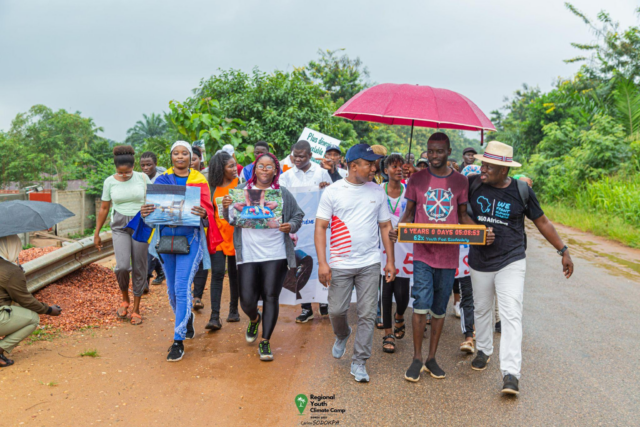
The climate emergency in Africa is not a distant, hypothetical scenario. It's a clear-eyed, science-based reality that demands our immediate attention. The climate clock is racing towards a tipping point. We've got less than 6 years to drastically lower greenhouse gas emissions to keep global heating below 1.5 degrees celsius and rewrite the climate narrative.
The vision of West Africa's youth is clear: to build a 100% renewable energy future. With political will, innovation, collaboration, and determination, West Africa can achieve a sustainable clean energy future
If you want to join in the fight, check out the resources on our website and help us spread the word on social media platforms with a few messages you can find here .
Post Africa Climate Summit Session in Benin: key outcomes and youth expectations ahead of COP28
On 4-6 September, the Kenyan government hosted the first-ever Africa Climate Summit, which concluded with the release of the African Leaders Nairobi Declaration on Climate Change and Call to Action. The Summit gathered around 20,000 delegates including grassroots, and frontline activists to represent the voice of civil society.
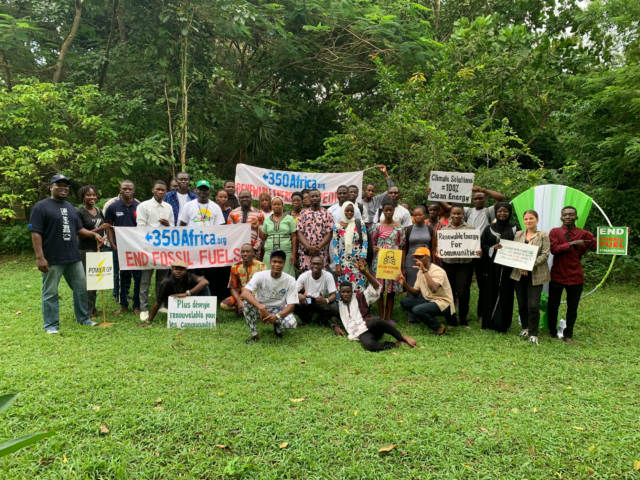
As part of the renewable energy debates with experts in the universities, the Renewable Energy Coalition (REC) members in Benin Republic organised on 23 September a session to highlight the key outcomes of the Africa Climate Summit and the need to massively scale up renewable energy in Africa.
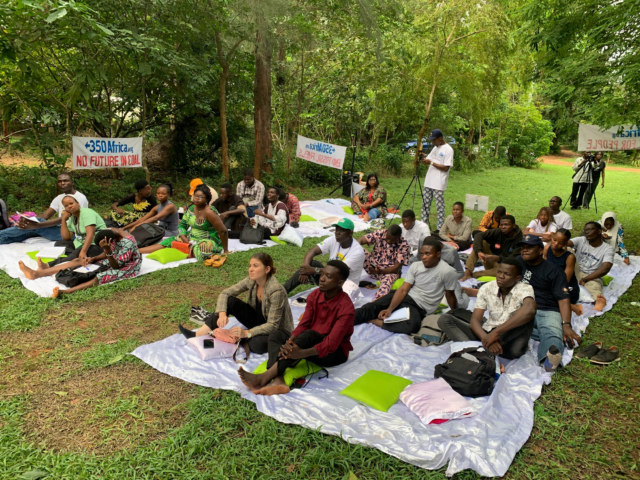
The session took place at the national university of Benin and gathered around fifty young people, journalists, civil society organisations and experts from the ministry of environment. The organisers highlighted some of the positive notes from the African Leaders Nairobi Declaration on Climate Change:
- Accelerate all efforts to reduce emissions to align with goals set forth in the Paris Agreement
- Honor the commitment to provide $100 billion in annual climate finance, as promised 14 years ago at the Copenhagen conference.
- Uphold commitments to a fair and accelerated process of phasing down coal, and abolishment of all fossil fuel subsidies.
Then, they reiterated the will to see more efforts from the African Leaders to increase renewable energy capacity on the continent to address Africa's energy needs and also to mitigate the impacts of climate change.
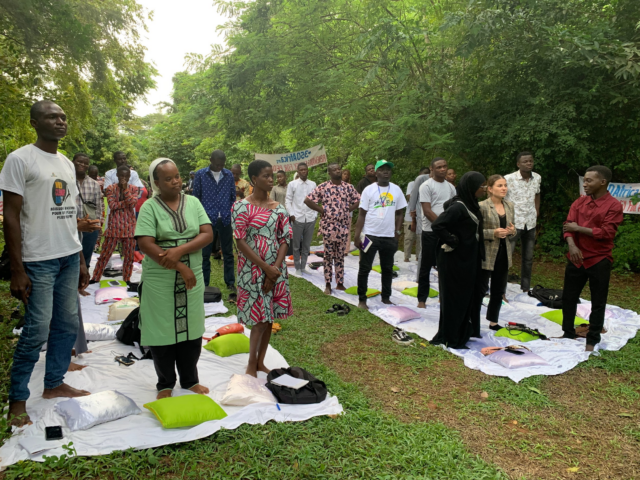
Together, the participants sang the energy future they want in Africa that should connect to 100% renewable energy instead of being connected to fossil fuels. During the space dedicated for questions-answers, the organisers shared their plan ahead of Power Up to denounce the fossil fuels industry and call for the real Climate Solutions instead of the push for the false Solutions, and the additional funding needed to tackle the climate crisis.
Anas Seko,
Renewable Energy Coalition (REC), Benin
Tripling renewable energy capacity by 2030: A Triumph for 1.5 Degrees at COP28
As the dust settles on COP28, climate activists around the world, including those at 350.org, are celebrating a significant step forward in the fight against climate change following the commitment of 130 countries to triple renewable energy capacity by 2030 which leads to a reduction of fossil fuel reliance and limitation of global warming to 1.5 degrees Celcius .
From November 4 to December 9, 350.org and its partners took to the streets globally under the banner of the "PowerUp", urging governments to triple their investment in renewable energy and demanding that major polluters take responsibility for the damage they've caused. The outcomes of COP28 suggest that these efforts have not been in vain, so let’s keep the momentum going.
Why 1.5 Degrees Celsius Matters: Let's Keep It Simple
You might have heard about the 1.5 degrees Celsius target, but what does it really mean? In simple terms, it's a crucial threshold set by the international community to limit the rise in global temperatures. Why? Because beyond 1.5 degrees the impacts of climate change become more severe and widespread. We're talking about more intense heat waves, rising sea levels, extreme weather events, and threats to our ecosystems and communities.
Now, imagine a world where we limit global warming to just 1.5 degrees Celsius . It's a world where we mitigate the worst effects of climate change, preserving a safer, more stable environment for future generations.
Tripling Renewable Energy Capacity: A Game-Changer
One of the big wins at COP28 is the commitment from 130 countries to triple renewable energy capacity by 2030. But why is this so important in the quest to keep global warming at 1.5 degrees?
The answer lies in the source of our energy. Right now, a significant chunk of our power comes from burning fossil fuels like coal, oil, and gas. These activities release massive amounts of greenhouse gas, trapping heat in the atmosphere and causing global temperatures to rise.
Renewable energy, on the other hand, comes from sources like the sun, wind, water, and geothermal heat. When we invest in these clean and sustainable sources, we reduce our reliance on fossil fuels, cutting down the emissions that drive climate change.
Africa gets to play a big role in this clean energy party as it is abundant in renewable energy potential in the form of wind, solar and other sources. Tripling the capacity not only reduces our reliance on fossil fuels but also harnesses Africa’s renewable resources for widespread economic and social development like access to electricity, jobs and better lives. We call on decision makers to invest more money to back up plans to triple renewable energy. This means tripling the money already invested into building solar farms, wind turbines, and other cool stuff that give us access to electricity. It's like having a big toolbox full of cool ways to make power without hurting our planet. To leverage Africa’s potential and realize the tripling of Renewable Energy, substantial funding is required to support the transition.
The Power of Public Pressure and Activism
The decisions made at COP28 reflect not only the efforts of policymakers but also the power of people coming together to demand change. The PowerUp mobilization, led by 350.org and partners, exemplifies how public pressure can influence political and economic decisions. When we take to the streets, raise our voices, and demand action, decision-makers take notice.
What's Next? Phasing out oil, coal and gas
While the commitment to triple renewable energy capacity is a major step forward, there's more work to be done. The scaling up of RE must also be supported by a resolve and concrete plans for the phase out of all coal, oil and gas. Civil society is calling for COP 28 to deliver on a decision to phase out fossil fuels by 2050, and for this decision to be reflected in the formal outcome of the conference.Why? Because we can’t limit global warming to 1.5 degrees unless we break free from fossil fuels. In addition, it is critical big polluters are held accountable for the damage they've caused and their role in the climate crisis. This means ensuring that those who contributed the most to the problem bear the responsibility of committing finances to supporting the just transition to renewable energy in developing nations, supporting these nations to adapt to climate change and compensating them for the losses suffered.
As we celebrate the victories at COP28, let's remember that our collective voice and action are powerful tools in the fight against climate change. By continuing to push for bold and ambitious measures, we can create a world where the 1.5 degrees Celsius target is not just an aspiration but a reality, safeguarding the planet for generations to come.



